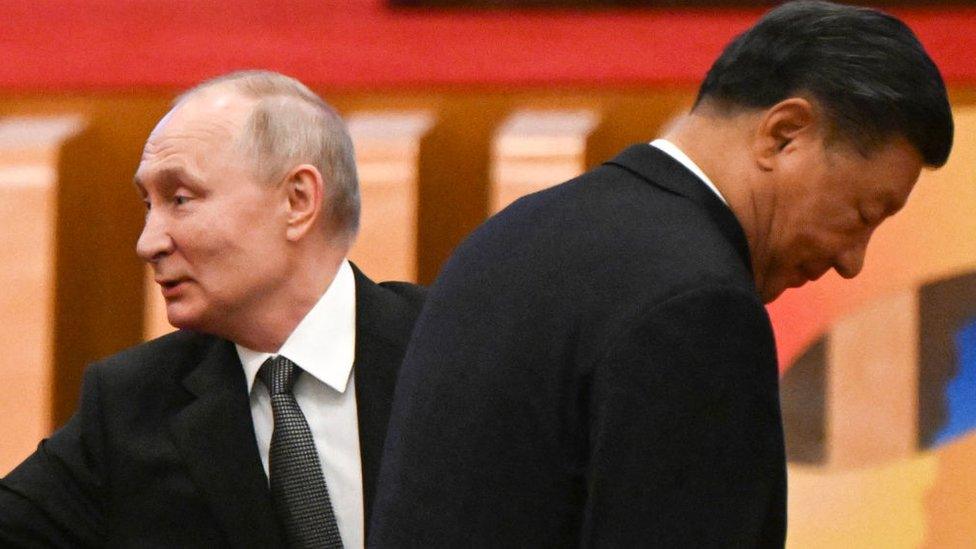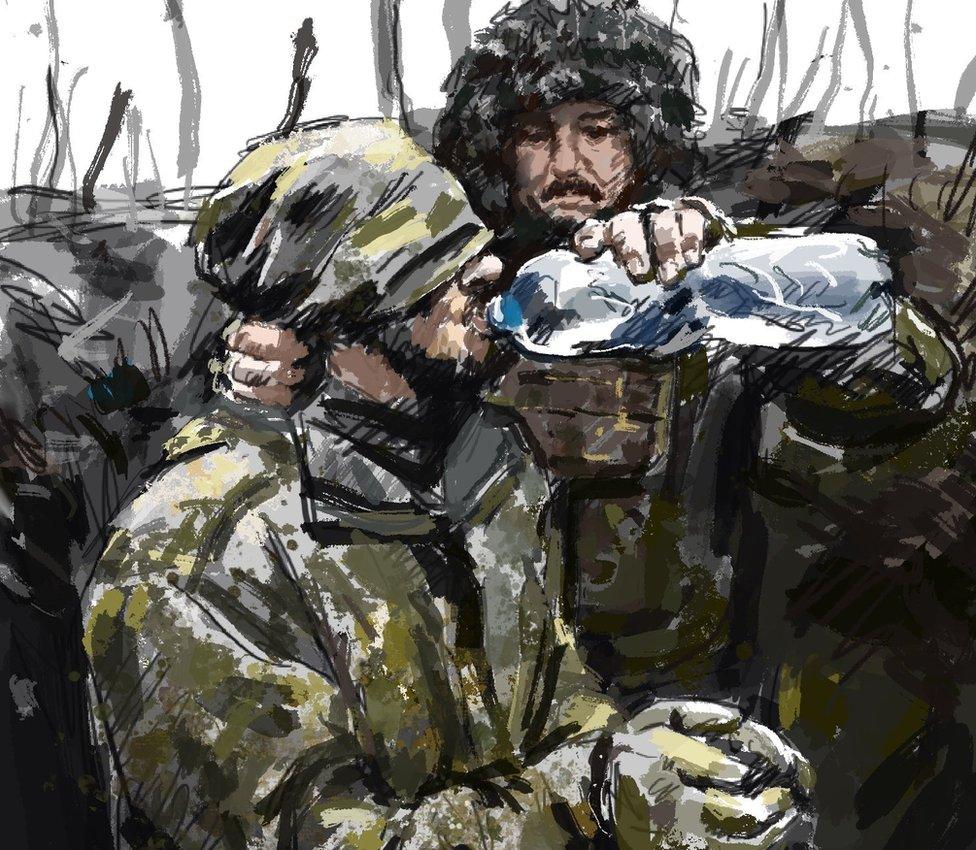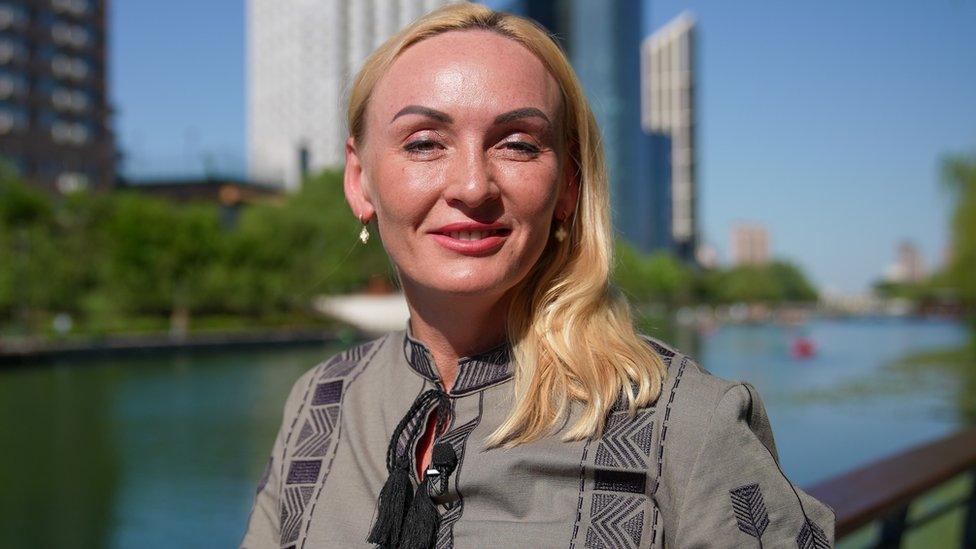China-Russia relations: What is Xi Jinping prepared to pay for Putin’s war?
- Published

Xi Jinping and Vladimir Putin are set to meet in Beijing this week
Beijing is set to welcome Russian President Vladimir Putin, who hailed the "unprecedented" level of ties between the two countries ahead of his state visit.
More than two years into his invasion of Ukraine, China has emerged as a vital ally. It has refused to condemn the war and continues to trade with a heavily sanctioned Russia, much to the ire of the US and the European Union.
However, it appears Mr Putin wants more. But is China willing to pay the price?
A balancing act
It is perhaps not surprising the Russian leader has chosen China as his first foreign trip since he was sworn in for a fifth presidential term last week. The two-day state visit comes as their relationship reached its "highest level ever", he told Chinese state media. He spoke of his interest in Chinese martial arts and philosophy, and said some of his family are learning Mandarin.
"In the face of a difficult international situation, our relations are still strengthening," he said.
But while Mr Putin brags about their friendship, Mr Xi might have reason to worry.
The US has just announced a raft of new sanctions against Beijing and Hong Kong-based banks and companies that work with Moscow, allegedly helping to evade existing restrictions.
Watch: Antony Blinken says the US will act if China does not stop sending 'critical components' to Russia
Because, while China is not selling arms to Russia, Washington and Brussels believe it is exporting tech and components essential for war. During his recent trip to Beijing, US Secretary of State Antony Blinken told the BBC that China was "helping fuel the biggest threat" to European security since the Cold War.
For them, this has become a red line. But China insists its stance on Ukraine is neutral - and the exports, which have commercial uses outside of war, are not breaking the rules.
Nevertheless, the allegations followed Mr Xi on his trip to France last week, distracting from what was supposed to be a charm offensive.
The Sino-sceptics and China hawks are also getting louder, urging Mr Xi to exert more pressure on his Russian counterpart, as the EU mulls tariffs of its own.
And the fact is China's sluggish economy can ill afford this pressure from trading partners. Weak demand at home means it needs those markets abroad.
All of this leaves Mr Xi in an awkward situation.
Finding the limits
Days before Russia invaded Ukraine, the two leaders announced a "no-limits" partnership to deepen co-operation. This made sense for the comrades in arms in their ideological struggle against the West.
Beijing still sees Moscow as key to reshaping a US-led world order. Trade between them is flourishing. Cheap Russian energy, including steady gas shipments via the Power of Siberia pipeline, have been a benefit for China.

Yet, as the war has dragged on, the alliance has not seemed so "limitless". For one, the term has almost disappeared from state media, a BBC analysis has found.
Beijing is downplaying the limitless nature of its strategic partnership with Moscow, says Zhao Tong, a senior fellow at the Carnegie Endowment.
"While China supports the goal of undermining Western influence, it does not agree with some of Russia's tactics, including the threat of using nuclear weapons. China is acutely aware of the reputational costs of appearing to offer unconditional support to Russia and is continuously refining its strategies to enhance its perceived legitimacy on the global stage."
On his recent visit to Europe, Mr Xi said the country is "neither the creator of the crisis, not a party to it or a participant". This is also what China keeps telling its own citizens.
'Ukrainians are still bleeding in trenches'
But the avowed neutrality doesn't mean sympathy for Ukraine is easily visible on China's highly-censored media.
Chinese state media still justifies Russia's invasion, calling it swift retaliation by Moscow against US-backed Nato expansion.
When Chinese artist Xu Weixin saw the first thunderous explosions hit the Ukrainian capital Kyiv on TV in 2022, he felt compelled to document it.
"I don't have a weapon, but I have my pen," he told the BBC from his studio in the US. His first drawing, a portrait of the Ukrainian President Volodymyr Zelenskyy, was a hit on social media.
"I've been painting every day since the war began. I didn't stop even for one day. When I got Covid, when I travelled abroad, I still drew every day."
While his art has not been censored in China, the reactions it drew surprised him.
"It's quite different to my previous experience," he said. "When I painted about coal miners, all the comments I got were positive. Even my paintings of the cultural revolution received praise. I hardly got any criticism."

Xu Weixin has been drawing scenes from the Ukraine war since it started in early 2022
But this time, he says, he saw a backlash. "It's fine, I just blocked them," he says. "Some of my friends unfriended me because they hold different views. But what I can do? I believe I'm doing a right thing. I want to be a role model for my daughter."
It's a sign of hope for Ukrainians like Vita Golod, who want to influence Chinese opinion. She was in Kyiv when the war broke out and decided to use her fluency in Mandarin to translate Ukrainian news into Chinese so she could share it on social media.
"We wanted to let people know the truth about this war, because we knew at the time there were no Ukrainian media agencies or outlets in China," she told the BBC on a visit to Beijing. She is now the chairwoman of the Ukrainian Association of Sinologists.
"It was tough emotionally to be honest, and it took a lot of time," she says. A team of about 100 people translated official news, President Zelensky's speeches, and the stories of ordinary Ukrainians caught in the war zone, she added. The name of their website is Wukelanzaixian - Ukraine Online in Chinese.
She says she is hoping to arrange a visit to Ukraine for Chinese scholars so they can see the destruction for themselves, and eventually help exert pressure on Russia. She realises this is an ambitious goal, but wants to try. Her brother is on the front line and her parents are still living in their hometown near Bucha.

Vita Golod wants to influence Chinese opinion through news and stories from the war in Ukraine
"People in Ukraine are still suffering, they are still hiding in shelters, still bleeding in trenches. Ukraine needs sanctions on Russia, not beautiful words."
So far, her work has not been censored, which implies some tolerance by the Chinese government.
Xi, the peace keeper
There are other voices coming from Beijing which suggests cracks may be emerging in how far some of the Chinese public, at least, are prepared to back this limitless relationship.
Feng Yujun, director at the Centre for Russian and Central Asian Studies at Fudan University, recently wrote in the The Economist that Russia was sure to lose in Ukraine.
It's a bold opinion in China.
But then, Mr Xi has also suggested he could be a peace keeper.
Last March, just days after his state visit to Moscow, he phoned the Ukrainian president Volodymyr Zelensky and stressed that China has "always stood on the side of peace". China also published a 12-point peace plan which argues against the use of nuclear weapons.
Yet when Presidents Putin and Xi meet this week, neither will likely signal any significant shift in policy.
But with the West growing more impatient with their alliance and Mr Xi's hopes of playing peace keeper so far unsuccessful, he will be calculating the risk of continuing to stand "shoulder to shoulder" with an international pariah who he once called both a comrade and his "dear friend".